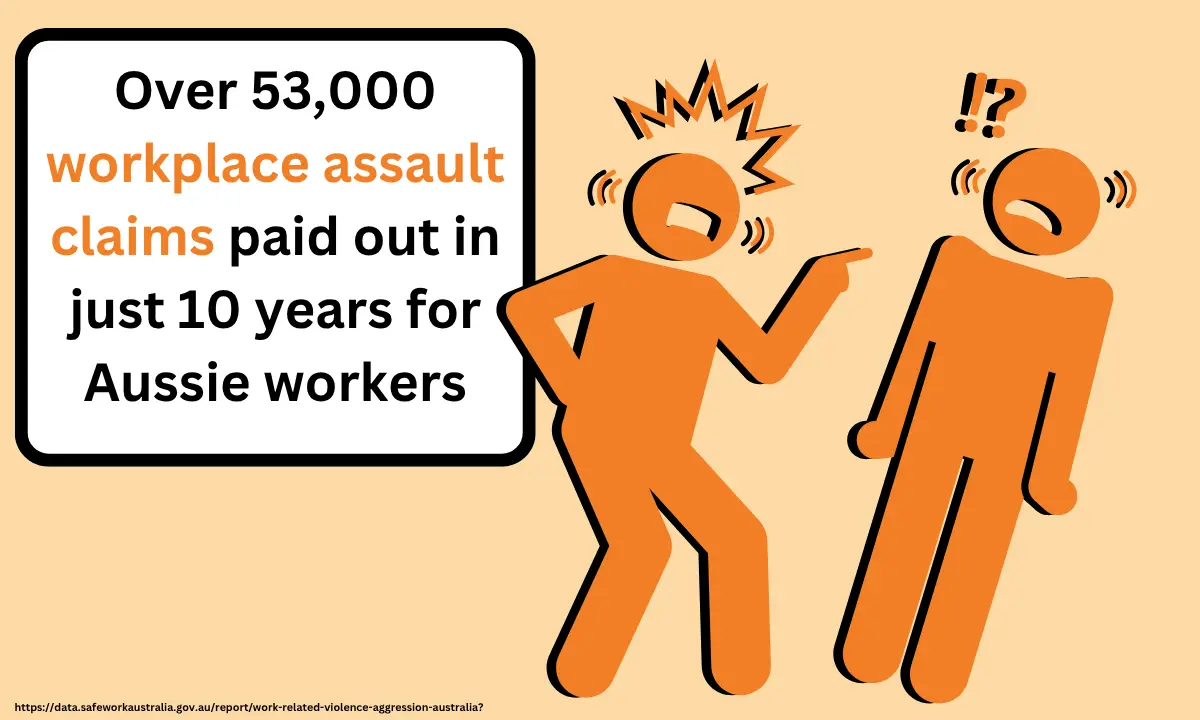Being assaulted at work can be more than just a physical injury. It can leave you feeling unsafe, confused, and unsure about your rights. Whether the incident happened suddenly or followed a pattern of escalating behaviour, workplace assault is never acceptable, and you never have to face it alone.
Many Australians are unaware that if they have been assaulted at work, they may be entitled to compensation. Workplace assault compensation is not just about covering medical expenses. It is about acknowledging what you have endured and helping you move forward.
If you are searching for answers about assaulted at work compensation or wondering how much compensation you can claim for assault at work, this guide is here to support you. We will explain your entitlement to claim, the claims process, and how Withstand Lawyers can help you take the next step toward compensation and recovery.

The Data Around Workplace Assault
Workplace assault is not a rare occurrence. In fact, it’s a growing concern across many Australian industries. While some cases make headlines, many more happen quietly, behind closed doors, often leaving victims feeling lost and unsure how to move forward.
Between 2012–13 and 2021–22, there were 53,139 accepted workers’ compensation claims in Australia for being assaulted at work. On top of that, another 12,721 claims were accepted for exposure to workplace or occupational violence. These numbers only represent the cases formally reported and accepted, with many more incidents likely go unreported due to fear, stigma, or lack of awareness.
The statistics show that workplace violence is not limited to high-risk jobs. While sectors like healthcare, community services, and retail tend to record higher rates of violent incidents, assault can occur in any workplace, whether it’s an office, construction site, warehouse, or school.
Victims of workplace assault may suffer a range of injuries, from broken bones and bruises to long-term psychological conditions such as anxiety, depression, or PTSD. The trauma does not always end when the physical wounds heal.
The growing number of workplace assault claims highlights the urgent need for employers to take proactive steps in preventing violence, supporting victims, and ensuring that workers know their rights when it comes to compensation.
What Does This Mean for Assaulted Workers?
For Australian’s assaulted at work, these statistics are more than just numbers. They represent real people facing serious physical and emotional trauma because of violence in the workplace. If you have been assaulted at work, the data confirms what many already know but rarely say out loud: this is not uncommon, and you are not alone.
The rising number of accepted compensation claims shows that workers are increasingly stepping forward to report incidents and claim compensation. But it also reveals that many workplaces are failing to provide safe environments, despite having a legal obligation to do so.
This trend means several important things for workers:
You have entitlements. If you’re assaulted at work, you may be entitled to compensation. This can cover medical expenses, lost income, a lump sum payment and a payout.
You don’t need to stay silent. Reporting the incident is not only your right, but it may also protect others from similar harm.
Support is available. From legal guidance to psychological care, there are systems in place to help you recover and move forward.
If you’ve experienced assault or violence at work, our experienced team of workers compensation lawyers can help you understand your options and claim the compensation you deserve.
Our legal costs for NSW workers compensation claims are covered by the Independent Review Office (IRO) so you never pay out of pocket to make a claim. Contact us today for a free claim assessment to see where you stand after being assaulted at work.
What Compensation Benefits Can I Claim After Being Assaulted At Work?
Healthcare expenses related to your injuries such as psychiatric therapy and medical equipment
Weekly support to help cover lost wages
Lump sum payment for permanent impairment
Support for everyday household tasks
If your employer was negligent and your whole permanent impairment meets 15%.
- 99% Success Rate
- Maximum Lump Sum Payout
- No Upfront Costs
- No Win No Fee

What Exactly Is Assault in the Workplace?
Assault in the workplace goes beyond physical altercations. Under Australian law, assault includes any act where a person intentionally or recklessly causes another person to fear immediate and unlawful violence. This means that even if no physical contact occurs, a threat or attempt to harm can still be considered assault.
In a work context, this assault can come from:
- Colleagues and Co-workers
Tensions, bullying, or unresolved conflict between team members can escalate into physical or verbal assault.
- Managers or Supervisors
When power is abused, it can lead to threatening, intimidating, or even physically aggressive behaviour. Assault from someone in a position of authority can be especially damaging, as it often involves a misuse of control and leaves the victim afraid to speak up.
- Clients or Customers
Customer-facing roles, such as those in healthcare, retail, hospitality, and community services, carry a higher risk of assault from clients. Many workers face aggressive or violent behaviour simply for doing their job.
- Contractors, Visitors, or Third Parties
Assaults can also come from people who are not directly employed by the business, such as contractors, delivery personnel, or visitors to the site. Employers still have a duty to protect workers from these risks.
It does not matter whether the assault is from a bullying boss or aggressive customers, you have the right to feel safe in your workplace. If you have been assaulted at work causing physical or psychological injury, you may have grounds to claim workplace assault compensation.
Types of Assault at Work
Physical assault in the workplace involves any act of intentional physical contact designed to cause harm or injury. This can include hitting, punching, slapping, pushing, kicking, grabbing, or throwing objects at another person. If you’ve been physically assaulted at work, you may be eligible to claim workers compensation for your injuries, including medical expenses, lost wages, and lump sum payments for permanent impairment.
Verbal assault in the workplace includes threats of physical violence, aggressive shouting, or the use of abusive, intimidating, or offensive language that causes a genuine fear of harm. Even without physical contact, these behaviours can result in significant psychological injury, such as anxiety disorders or PTSD. If you’ve been verbally assaulted at work, you may be entitled to compensation under NSW workers compensation law.
Sexual assault or harassment in the workplace includes unwanted physical contact of a sexual nature, inappropriate comments, sexually suggestive gestures, or coercive behaviour. If you’ve experienced sexual harassment or assault at work, you may be entitled to workers compensation for physical and psychological injury.
Psychological or emotional assault in the workplace refers to behaviour intended to intimidate, humiliate, isolate, or control another person. This may include repeated bullying, gaslighting, verbal abuse, manipulation, or other forms of targeted mistreatment. These behaviours can lead to serious mental health conditions such as anxiety disorders, depression, or PTSD, and may be compensable under NSW workers compensation laws if a diagnosed psychological injury occurs.
Threats of violence in the workplace can still amount to assault, even if no physical harm occurs. This includes threatening emails, text messages, verbal abuse, or in-person confrontations that cause a genuine fear for personal safety. Under NSW workers compensation law, if such threats result in a diagnosed psychological injury such as anxiety disorders, or PTSD, you may be eligible to claim compensation.
Click here to read more about mental health workers compensation claims.
If you have experienced any of these types of assault at work, you may be eligible for compensation under NSW workers’ compensation law.
Our experienced workplace assault lawyers can help you understand your rights and assess your eligibility to make a claim. We offer a free claim check, and our legal fees are covered by the Independent Review Office (IRO), so you pay nothing out of pocket to make a NSW workers compensation claim.
Contact us today to find out what compensation you’re entitled to after an assault at work.
I Was Assaulted At Work. Can I Claim Compensation?
If you have been assaulted at work, you may be entitled to a range of compensation benefits under NSW workers’ compensation laws. These entitlements are designed to help you recover physically, emotionally, and financially after such a traumatic experience.
Here is what you may be eligible to claim if you’re assaulted at work:
✅Medical Expenses and Treatment Costs
All reasonable and necessary medical costs related to the assault can be covered. This includes:
- hospital visits
- GP consultations
- specialist care
- surgery
- medications
- ongoing psychological treatment or counselling.
✅Weekly Payments for Lost Income
If you are unable to work due to your injuries, you may receive weekly payments to compensate for lost wages. The amount depends on how long you are off work and your level of incapacity:
First 13 weeks: Up to 95% of your pre-injury average weekly earnings (PIAWE), including regular overtime and allowances.
Weeks 14–260: Payments may reduce to up to 80%, depending on your capacity to return to work. If you work at least 15 hours a week and earn below your pre-injury wage, you may still receive up to 95%.
After 260 weeks: Payments generally cease after 5 years, however payments can continue if you’ve been assessed with a Whole Person Impairment (WPI) of beyond 20%.
✅Rehabilitation and Return to Work Support
Under the NSW workers compensation system, you may be entitled to rehabilitation services to help you return to work safely. This can include workplace modifications, vocational retraining, graduated return-to-work plans, and access to support programs tailored to your physical or psychological recovery.
✅Lump Sum Permanent Impairment Compensation
If you’ve suffered a serious injury as a result of an assault at work, and that injury causes lasting damage, you may be entitled to a lump sum compensation payment. This payment is based on a Whole Person Impairment (WPI) assessment, which evaluates the permanent impact the assault has had on your health and quality of life.
To determine if you are eligible for a lump sum claim, you will need to undergo a medical assessment by an Independent Medical Examiner (IME) once your injury stabilises (typically after 6 months). Our workers compensation lawyers are able to organise this assessment on your behalf.
For physical injuries, you must have at least 11% WPI to qualify.
For psychological injuries resulting from the assault, such as PTSD or depression, a minimum of 15% WPI is needed.
This lump sum payment recognises the permanent impact your injury has had on your health, lifestyle, and earning capacity. If your whole person impairment rating is 15% or greater, you may also be eligible for a work injury damages claim (also known as a common law claim) if your injury was caused by employer negligence.
Unsure if you qualify? Contact us today for a free claim assessment to discover what you may be entitled to claim after an assault at work.

How Much Compensation Can You Receive for Assault at Work?
The amount of compensation you can receive for a workplace assault varies significantly based on your individual circumstances. No two cases are the same, which is why it’s important to understand the factors that determine the value of your claim.
Factors That Affect Your Compensation Amount
Several key factors influence how much compensation you may be entitled to if you’ve been assaulted at work, including:
1. Loss of Income
If the assault caused you to take time off work or limited your ability to return to your job, you may be compensated for lost income. The maximum weekly payments for those unable to work after a workplace assault is $2,569.60 per week, however the amount you receive will vary based on your pre-injury average weekly earnings and whether you are able to return to work in some capacity.
2. Medical and Treatment Costs
Your claim may include the cost of current and future medical treatment, including surgeries, medications, therapy, and rehabilitation. The more ongoing care you require, the higher the compensation is likely to be to cover these treatment costs.
3. Permanent Impairment Assessments
If your injury is permanent, a Whole Person Impairment (WPI) assessment will determine whether you are eligible for lump sum compensation.
A minimum of 11% WPI for physical injuries and 15% WPI for psychological injuries is required to be eligible to claim a lump sum payment.
The greater the WPI percentage, the greater the lump sum compensation amount.
As of July 2025, the maximum permanent impairment lump sum compensation for an assault at work is $757,760.
Click here to read more about the NSW permanent impairment payout amounts.
Our experienced team of workers compensation lawyers can help you understand how these factors apply to your situation and ensure your compensation reflects the true impact of what you’ve been through. Contact us today for a free claim assessment to find out if you’re getting the maximum compensation after an assault at work.
Can You Sue Your Employer for Workplace Assault?
In some cases, it may be possible to sue your employer if you were assaulted at work. While most compensation claims in NSW are handled through the workers’ compensation system, there are situations where you may also have grounds for a common law claim, also known as a work injury damages claim, if your employer’s negligence contributed to the assault occurring.
Unlike standard workers compensation benefits, a successful common law claim can provide a single lump sum payout for:
✅Past economic loss
✅Reduced future earning capacity
✅Loss of Superannuation
To be eligible to make a common law claim, you must have at least 15% Whole Person Impairment (WPI), and you must be able to show that your employers actions, or failure to act, contributed to the assault taking place.
Employer Responsibility and Negligence
Employers in Australia have a legal duty to provide a safe working environment. This includes protecting workers from known risks, such as violent customers, aggressive co-workers, or unsafe conditions that could lead to physical or psychological harm.
Your employer may be found negligent if they failed to:
Respond to previous complaints or warnings about violent behaviour
Provide proper training, supervision, or security
Implement clear workplace violence policies and procedures
Take reasonable steps to prevent foreseeable risks
In such cases of negligence, you may have the right to claim compensation for damages beyond what is available under workers’ compensation.
However, it’s important to understand that any payout from a common law claim is a final settlement of your injury entitlements. Once the settlement is accepted, you will no longer be eligible for ongoing weekly payments, medical expenses, or rehabilitation support under the NSW workers compensation scheme.
To ensure you’re making the best decision for your future, contact our experienced work injury damages lawyers for a free claim assessment.

How Can I Start My Workplace Assault Compensation Claim?
If you’ve been assaulted at work in NSW, it’s important to act quickly to protect your health, your rights, and your ability to claim compensation. Below is a clear, step-by-step guide to help you through the claims process after a workplace assault.
Immediately report the assault to your employer or supervisor in writing. This creates a formal record of the incident. If the assault was physical or involved threats of violence, you should also consider reporting it to the police and SafeWork NSW, especially if there’s a risk to others.
Visit your General Practitioner (GP) for treatment. Be detailed about all injuries, including any psychological effects like anxiety, panic attacks, or sleep disturbances that you may be experiencing since the assault.
Your GP will issue a Certificate of Capacity, which is a document that is required when making your workers’ compensation claim.
Your employer must notify their workers’ compensation insurer within 48 hours of becoming aware of your injury. You can also contact the insurer directly to begin the claim process.
Once your employer is notified, you can submit your claim through their workers compensation insurer. To do this, you’ll need:
A completed Workers Compensation Claim Form
Your Certificate of Capacity and any supporting medical reports from your GP and specialists
Relevant workplace documents such as incident reports, emails, or witness statements to support your case
If your claim is complex, particularly if psychological injury is involved or the employer disputes your version of events, then engaging a workers’ compensation lawyer can protect your rights.
Our team of experienced personal injury lawyers are ready to help. Contact us today for a free claim assessment to see what you could be eligible to claim.

How Can a Workplace Assault Lawyer Help You?
Being assaulted at work can leave you feeling overwhelmed, unsafe, and unsure of your legal options. A workplace assault lawyer can guide you through the claims process, protect your rights, and help you secure the compensation you’re entitled to.
How Our Workplace Assault Lawyers Support You:
✅ Explain Your Legal Rights
We’ll help you understand your rights under NSW workers’ compensation law and determine whether your case qualifies for additional claims, such as TPD claims or a common law claim after employer negligence.
✅ Gather Strong Evidence
Our lawyers assist in collecting and organising critical evidence, such as medical reports, incident records, emails, CCTV footage, or witness statements to strengthen your claim.
✅ Lodge Compensation Claims
We manage the entire process of submitting your compensation claim from start to finish, so you can focus on recovery while we take care of the rest.
✅ Maximise Your Compensation
Whether through negotiation or legal action, we work to secure fair compensation for your injuries, lost income, psychological harm, and any long-term impacts on your ability to work.
If you’ve been assaulted at work, our experienced team is here to help. Contact us today on 1800 952 898 or complete our online form for a free claim assessment and personalised advice after an assault at work.

Issa Rabaya
• Bachelor of Laws
• Graduate Diploma in Legal Practice
• Approved Legal Service Provider to the Independent Review Office
• Member of the Law Society

Issa Rabaya
• Bachelor of Laws
• Graduate Diploma in Legal Practice
• Approved Legal Service Provider to the Independent Review Office
• Member of the Law Society
Workplace Assault Compensation FAQs
Yes. If you were injured at work, whether by an assault or accident, you may be entitled to workers compensation in NSW. This applies to both physical and psychological injuries. Compensation can cover medical expenses, lost wages, and rehabilitation costs.
Yes. Psychological injuries such as anxiety disorders, depression, or PTSD caused by workplace assault are recognised under NSW workers’ compensation laws.
In addition to a workers compensation claim, you may be able to sue your employer if their negligence contributed to the assault and your injuries are assessed above 15% whole person impairment (WPI).
An employer may be negligent if they failed to provide a safe work environment or ignored previous warnings about violent behaviour.
Yes, there are strict time limits depending on the type of claim. For workers’ compensation claims in NSW, the assault should be reported to your employer as soon as possible, and the claim should ideally be submitted within six months of the incident. In some cases, extensions may be granted if there is a valid reason for the delay.
If you are considering a common law claim against your employer, the time limit is three years from the date of the assault or the date the injury was first discovered.
Compensation depends on the severity of your injuries, loss of income, medical needs, and whether your injuries are permanent. Every case is different, but you may be entitled to weekly payments, medical expenses, rehabilitation costs, and potentially a lump sum payout. Contact our workers compensation lawyers today to receive a free claim assessment for personalised information about your claim.
No. It is illegal for an employer to fire or discriminate against you for making a workers’ compensation claim. If you believe you’ve been treated unfairly, legal action can be taken.
Unable to Return to Work After a Workplace Assault? Consider Making a TPD Claim
If you’ve been assaulted at work and are unable to return to your job, either due to physical injuries or long-term psychological trauma, you may be eligible to make a Total and Permanent Disability (TPD) claim through your superannuation fund.
A TPD claim is separate from workers compensation and provides a lump sum payment if your injuries prevent you from working in your usual occupation, or in any occupation you’re reasonably suited for based on your education, training, or experience.
What Are the Eligibility Criteria for a TPD Claim?
While criteria vary slightly between superannuation funds, most require you to show that:
You’re unable to return to work in any occupation you have training or experience in
Your condition has been assessed by medical professionals
You held active superannuation insurance at the time you stopped working
Can I Claim TPD and Workers Compensation?
Yes, in many cases you can claim both. While workers compensation may cover your weekly income and medical treatment, a TPD payout provides a lump sum payout to provide you with financial security into the future.
How much is a TPD claim worth?
The value of a Total and Permanent Disability (TPD) claim depends on several factors, including your level of insurance cover, the terms of your superannuation policy, and the number of super funds you hold. If you have multiple active super funds with TPD insurance, you may be able to claim from each one separately.
On average, TPD payouts in Australia range from $50,000 to $350,000, though some policies may offer higher benefits.
Not sure if you have TPD cover or if you’re eligible to claim? Contact our experienced TPD lawyers for a free claim assessment and find out what you may be entitled to claim. We operate on a No Win No Fee basis with no upfront costs, so you never pay out of pocket to make a claim.




